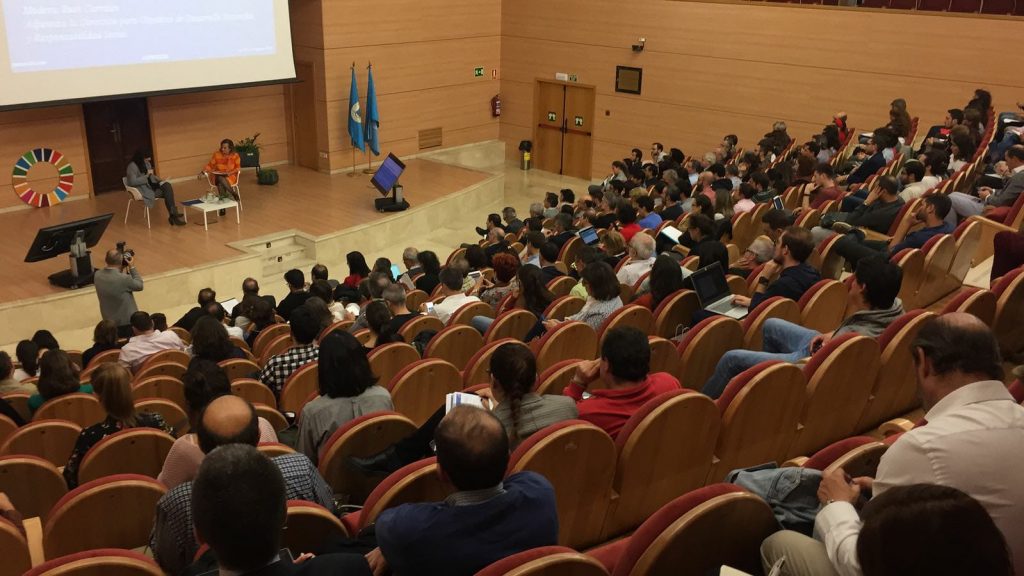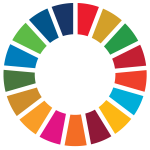Esta web utiliza cookies para que podamos ofrecerte la mejor experiencia de usuario posible. La información de las cookies se almacena en tu navegador y realiza funciones tales como reconocerte cuando vuelves a nuestra web o ayudar a nuestro equipo a comprender qué secciones de la web encuentras más interesantes y útiles.
“Technology and Innovation for the SDGs” Seminars programme (SDGs Seminars)
Description
Institution
Universidad Politécnica de Madrid (UPM)

Organizations/areas of the university involved
launched by the Vice-Rector’s Office for Research and Innovation and promoted by the Center for Innovation in Technology for Human Development (itdUPM), Center for Biotechnology and Plant Genomics (CBGP), Center for Studies and Research for Agricultural and Environmental Risk Management (CEIGRAM), Nuclear Fusion Institute, KIC Raw Materials at UPM, EIT Health at UPM and EIT Digital at UPM
Country
Spain
Link to learn more...
“Technology and Innovation for the SDGs” Seminars programme is a periodical space for interaction among researchers and other stakeholders which focuses on cross-cutting issues linked to sustainability transformation.
The SDGs Seminars was established in 2018 at UPM as part of a long-term strategy to respond to coming changes in European R&D policies and increase UPM’s sustainability impact. The programme has five main goals: to stimulate interaction among UPM research units; to generate interdisciplinary research initiatives around cross-cutting sustainability challenges; to strengthen the culture of innovation and entrepreneurship in research units; to increase UPM impact in terms of the 2030 Agenda; to strengthen links with external actors. It is also expected to empower and motivate students at different levels to become active actors in the configuration of a more sustainable future and university.
The process went beyond the classical concept of seminar, conceived and assessed as a relational and developmental process more than a simple logistical challenge. For that purpose, social innovation methodologies were used, through which interdisciplinary dialogue, horizontality and search of collaborative solutions, were built into the seminars.
The seminars were addressed to the faculty, research community, students and decision-makers of the UPM. In addition, external agents (companies, administrations and civil society) participated in the seminars.
The program began with an official kick-off, followed by 21 seminars and workshops organized in thematic series that continue to this day. The aim of the first series, “”Introduction to the SDGs””, was to raise awareness of the SDGs among researchers and to create a common understanding of the UPM’s potential role in transforming sustainability. The remaining three series focused on cross-cutting sustainability issues identified during the first series, “”Energy Transition and Climate Change””, “”Circular Economy and New Materials”” and “”Sustainable Management of Natural Resources””. The program is successfully continuing with a fourth series dedicated to “”Clean and Healthy Cities””.
The next steps of the program will seek to connect research with the ongoing process of city transformation, specifically with the European mission that will drive from 2021 the climate neutrality of one hundred cities by 2030, Roadmap towards climate neutrality in Madrid and the institutional commitment to achieve climate neutrality of UPM campuses in 2040.
Results and impact measured or expected
The programme has achieved important outcomes at the strategic and institutional level: the research strategy of UPM has now been reformulated and oriented towards the SDGs. The incentive system, particularly the funding allocation scheme, has been reoriented; new institutional structures have been created to foster collaboration, i.e. eight interdisciplinary research communities around cross-cutting sustainability issues and a space to connect them.
More than 1,200 UPM professors, researchers and students, as well as representatives of external organizations, participated in the SDGs Seminars, including representatives of 70% of UPM’s research groups. 17 high position representatives from public, private and civil organizations, as well as 59 members of the UPM’s community, participated as panelists. The impact has been measured through a thorough systematization of participation information, as well as surveys. The people involved were mainly from Madrid, but national and international entities and individuals have also participated.
Connection with the SDG framework
The SDGs Seminars seek to contribute to SDG Education through capacity building and the connection of teachers, researchers, university staff and students from various disciplines and at different stages of their academic career. The objective is to empower the academic community to conduct interdisciplinary and SDG-oriented research and support the implementation of SDG-oriented educational initiatives, in both curricular (inclusion of the SDGs in subjects, creation of a training itinerary on cities and SDGs in MOOC format) and extra-curricular activities (multi-stakeholder inspirational dialogues on sustainability-related topics, SDG training workshops, etc.). Furthermore, the program promotes and facilitates the creation of processes and spaces that generate networks and alliances of colleagues and experts that students can draw upon in their engagement with the SDGs and particularly, the development of challenge or problem-based modules in connection with relevant problem owners.
Barriers and follow up
At the individual level, there was a lack of awareness of the SDGs among researchers and a lack of trust in the possibility of achieving them. More than half of the researchers did not usually work with non-academicsand some even felt that interdisciplinarity could hinder scientific rigor. Institutional barriers were also detected, such as a lack of incentives for cross-sector collaboration. As an example, researchers don’t often assess the social impact of their research and knowledge transfer is seen as a loss of time, because of its low curricular profitability. Individual barriers were addressed through specific training and dialogue sessions. Institutional barriers are more difficult to address. Given the lack of extrinsic incentives to participate in the seminars, an important goal was to stimulate intrinsic motivation and make the seminar an enriching and meaningful experience.
Transferability of the initiative
Just as we have been inspired by the transdisciplinary work done by other ISCN universities, such as Harvard, MIT and TU-Delft, our experience can also be inspiring for other universities. Since all the learnings collected have been exhaustively recorded and systematized in various formats, such as videos, guides and manuals, the experience could be easily transferred to other universities, in different geographical and cultural contexts.
UPM also leads the EELISA alliance, which is part of the recently developed initiative of European universities. This includes an initiative called “”EELISA communities””. These are interdisciplinary, challenge-based spaces that bring together students, professors and researchers from all partner universities with practitioners, citizens and organizations to find innovative solutions to real-world challenges. EELISA will create the conditions to disseminate the reasoning of the SDG-seminars to other members of the alliance, and will incorporate students and a teaching and learning dimension to the interdisciplinary communities.
Education 4 SDG funciona gracias a WordPress

